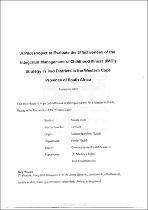A Pilot Project to Evaluate the Effectiveness of the Integrated Managen1ent of Childhood Illness (IMCI) Strategy in Two Districts in the Western Cape Province of South Africa
Abstract
The integrated Management of Childhood Illnesses (IMCI) has been adopted as a national programme in South Africa to address facility-based management of acute childhood illnesses. This programme is an internationally endorsed WHO/UN1CEF strategy which aims to reduce childhood mortality and morbidity by addressing the five common illnesses directly responsible for 70% of all childhood deaths world
wide in an integrated manner (South African Health Review 2000). The five common killer diseases throughout the world are respiratory illnesses, diarrhoeal disease, measles, malaria and malnutrition. The young child morbidity and mortality profile in South Africa is much the same as the rest o f the world; of the five commonest killer diseases, respiratory illnesses, diarrhoeal disease and malnutrition or a combination of these conditions are the most important. These are the diseases upon which IMCI in South Africa focuses (South African Health Review 2000). HIV/ AIDS has now also been added to this list. The goal of the IMCI programme is to train all primary health care workers in IMCI by the end of 2003. The facility-based component of IMCI trains health workers using an eleven day training course consisting of classwork and hands-on clinical practice using integrated case management guidelines. The training of each health worker is costly in terms of time and money. Health workers are absent from their normal duties for the eleven day course, leaving health facilities even more stretched with limited staff. South Africa is relying upon, and investing enormously, in this untested IMCI strategy to reduce childhood morbidity and mortality. Despite the heavy cost involved in the implementation of IMCI, there have been very few international and no national evaluations on the effectiveness of the IMCI intervention. It is essential that the IMCI strategy be evaluated to see if it is meeting its objectives. In the Western Cape Province of South Africa, the IMCI strategy is first being implemented in the Tygerberg Administration. This presents an ideal opportunity to measure the impact of IMCI. In this study the preventive, promotive and clinical management of sick children by health workers will be assessed and measured before and after the implementation of the JMCI strategy, using previously tested
standardised tools. The results of this evaluation will then be reported back to the various stakeholders involved, in order that any changes necessary can be implemented speedily and hence strengthen the impact o f the IMCI programme.

